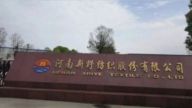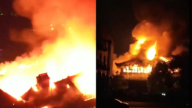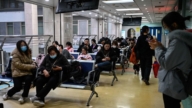【新唐人2012年1月16日讯】孟子曾经说过:商朝的纣和夏朝的桀失去天下,是因为失去人民的支持,失去人民的支持,是因为失去人民的心。(桀纣之失天下也,失其民也﹔失其民者,失其心也。)如今,在中国大陆,民众抗争维权事件层出不穷,各个社会阶层的百姓都已经对中共失去信心,以至于绝望,折射出中共穷途末路、濒临灭亡瓦解的景象。
2011年9月,广东陆丰乌坎村民众敲响在法事、喜事、祭神时才用的铜锣,为中国大陆的维权运动翻开新的一页,上万名群众把剥削村民土地及权益的中共村党支书、村委会主任驱逐村外。12月23号,村民选出了中共政权下第一个没有共产党的“临时代表理事会”。乌坎村民和中共对峙僵持不下,以维权度过2012年的新年。
乌坎村效应继续发酵,蔓延到了福建省晋江回族村,上千村民在两周内两次抗议贪官私吞卖地款项。
中国大陆“抗强拆”不再是零星的个别事件,过去两年,民众到了必须自制武器对抗当局强制拆迁。去年9月,山东临沂市兰山区农民以汽油桶、烟花弹、土制炸弹抵制强拆。此外,在山西、湖南、广东、福建等地都发生了民众土制武器抗拆维权事件。
2009年11月,成都妇女唐福珍以自焚对抗强拆,从此,大陆百姓用生命来抗议政府拆迁的事件即层出不穷;去年11月,河南郑州一名81岁的老太太自焚抗拆。今年1月4号,河南省洛阳市发生了两起因强拆引发的自焚案件,一名男村民被火严重烧伤;另一名女村民爬上屋顶,往身上浇了汽油准备自焚被劝阻幸免遇难。
在中国,许多人抗议当局强拆,用尽所有管道却不得结果,最终把案件带到了联合国, 显示民众已经对国内的中共政权彻底绝望,只有求助其他国家。
除了抗拆,中国还存在许多社会矛盾,如贫富悬殊、中共官员滥用权力,甚至城管也狐假虎威欺压民众等。
旅居外国的社会及经济学家何清涟曾指出,中国的社会矛盾根源于中共的一党独大。
浙江维权人士邹巍认为,中国政治改革停滞不前,社会矛盾已经达到顶峰,抗拆等群众事件,实际上是公民运动的雏形。
邹巍:“政治体制的改革目前处于一个停滞阶段实际上,那麽社会的矛盾加剧,当局在政治体制改革上无能为力。就像我们前不久看到清华大学有一个报告说,现在进入了一个社会停滞的陷阱。现在的情况已经是比前苏联的所谓的‘停止时期’社会矛盾更加严重的境地。”
而中国的知识份子也开始挑战中共的独裁政权,如胡佳、维权律师高智晟、陈光诚、艺术家艾未未等人。
另一方面,胡润《2011中国私人财富管理白皮书》显示,目前,中国已移民的千万富豪占14%,考虑移民的占46%,而33%的千万富豪拥有海外资产。根据报导,最近3年至少有170亿元资金流向国外,单是2010年移民数量已增长近30%。
综合来看,无论是从传统的“士农工商”社会阶层看,还是现代社会的上层、中层、下层的社会结构看,中国社会已经全面的唾弃中共。《尚书?泰誓中》说:“天视自我民视,天听自我民听。”当一个政权已经到了天怒人怨、逼得民不畏死的地步,还能有不消亡的天理吗?
新唐人记者吴惟、王明宇综合报导。
Losing The State Due To Losing The Peoples’Hearts
Chinese philosopher Mencius said that the regimes of Shang
and Xia lost their states for losing support from the people.
Losing peoples’support derives from losing peoples’hearts.
Today China keeps seeing incessant mass protests.
All social classes have lost confidence in the Chinese
Communist Party (CCP) regime.
The present picture of China reflects a scene of the CCP’s
dead end on the brink of collapse.
In September 2011, the Wukan villagers in Guangdong
turned a new page for China’s rights defense movements.
10,000 or more residents expelled the village’s CCP director
and secretary who were accused of illegally selling farmland.
On December 23rd, the villagers elected an Interim Council,
the first non-CCP village-elected organization in China.
The New Year 2012 was spent under the ongoing stalemate
between villagers and the CCP regime.
The Wukan village effect has expanded, reaching the Muslim
Village of Jinjiang, Fujian Province.
Within two weeks, 1,000 villagers staged two mass protests.
Local corrupt officials were accused of stealing land revenue.
“Enforceable demolitions" are no longer sporadic and isolated.
Over past two years in China, the masses were forced to use
homemade weapons against local authorities’forced eviction.
In September 2011, farmers in Linyi, Shandong province used
gasoline and homemade firework bombs, against demolitions.
Moreover, home-made weapons have been seen in forced
demolitions at provinces of Shanxi,Hunan,Guangdong,Fujian.
In November 2009, Chengdu woman, Tang Fuzhen self-
Immolated to protest at the official demolition.
Since then, numerous anti-demolition cases at the cost of
human life kept emerging across China.
In November 2011, a 81 year-old woman in Zhengzhou,
Henan,self-immolated protesting against the demolition.
On January 4, the official demolition triggered two villagers
to self-immolate in Luoyang, Henan province;
A male villager was severely burned and a female villager
climbed onto the roof, pouring gasoline over her body.
The would-be self-immolation was prevented when the
Woman was persuaded to give up the idea.
In China, all the petition channels for anti-demolition are
blocked by the authorities.
Chinese people have to petition the UN to seek international
aid, showing an attitude of sheer despair towards the CCP.
More social clashes exist in today’s China, aside from
the forcible demolition.
E.g. the sharp disparity of wealth, CCP officials’ abuses of
power, urban management officers’ bullying the masses, etc..
He Qinglian, U.S.-based sociologist & economist, said the root
cause of China’s social conflicts was CCP’s dictatorship.
Zou Wei, Zhejiang rights activist reviewed China’s current
social conflicts as prototypes of a citizen movement.
Now in China, political reform lags, social conflicts peaked,
mass protests like anti-demolition frequently broke out.
Zou Wei: “The political system reform is in fact in stagnation,
yet the social conflicts keep increasingly intensifying.
The authorities are incompetent at political system reform.
A recent report by Tsinghua University says that China is
caught up in a social stagnation trap.
Now China has a more serious situation than that during the
so-called “stagnation time" of the former Soviet Union."
Chinese intellectuals also began to challenge CCP’s
dictatorship.
Among these intellectuals are Hu Jia, human rights lawyer
Gao Zhisheng, Chen Guangcheng; artist Ai Weiwei, etc.
Hoogewerf’s 2011 China Private Wealth Management White
Paper shows 14% of Chinese millionaires have emigrated.
46% of them are considering international immigration, while
33% of millionaires own assets overseas.
In the last three years, at least 17 billion RMB was reported to
flow out of China.
In 2010 alone, the number of immigrants grew by nearly 30%.
The whole picture shows that China’s whole society; upper,
middle and the under classes, are fully shunning the CCP.
A regime like the CCP has incurred widespread indignation
and discontent, and the populace are not afraid of death.
Would such a regime escape the heaven’s punishment,
Which is its demise?
NTD reporters Wu Wei and Wang Mingyu.































